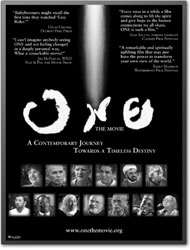| ||
Ward and Scott's wonderful adventure
by Judith Reynolds The late, great Joseph Campbell, were he still alive, might have gushed over “One, the Movie: A Contemporary Journey Toward a Timeless Destiny.” As you recall, he imprinted the mantra “follow your bliss” on a whole generation. First-time filmmaker Ward Powers belongs to that generation. Now a middle-aged Detroit lawyer, Powers makes much of a 2002 epiphany. It was then, he tells us in a voice-over at the beginning of the film, he awoke out of a sound sleep and felt a “strange compulsion to make a movie.” The result is “One,” and the producing company is called (what else?) Circle of Bliss Productions. Again and again, Powers tells us this is a first-time effort. He reiterates his Eureka moment, his impulsive decision, his lack of training, and his technical naiveté. In the movie, he includes pictures of himself, his cousin and co-creator Scott Carter, family members, cohorts, and the crew here, there, and everywhere. Like a freshman film student, Powers can’t step aside. He’s so enthralled that he, a grown-up with three children and a day job, would drop everything to make a movie. “Hey, look at me” is the ever-present subtext. What’s sad is that Powers and Carter have a decent premise. The original idea was to make a movie about the meaning of life by asking dozens of people that very question. The team didn’t need to ask more, but they crafted a list of 20 related questions. They borrowed a camera and with “no experience, no connections, no script, no (real) equipment, and no budget” set out to interview people in the Detroit area. They asked: Why are we here? Where do we go when we die? How do you describe God? What’s the meaning of life? What’s the current condition of the world? The latter called for a nonverbal response, and it’s the most juvenile sequence in the film. Silently, responders mime screaming, choking, exploding or hiding. The question-and-answer format translates, of course, into talking heads. For any filmmaker, the issue is how to avoid boredom and how to create shape, order and dramatic tension. Powers employs a sophomoric framing device and an obvious metaphor for a spiritual journey. Shot in black and white, the frame depicts a guy in a crummy hotel. The scene includes media announcements of a world gone mad. Eventually the guy walks out of the hotel into a world of alleyways and bus stops. In short, limited clips, he briefly connects with a few people and eventually leaves the road for a river. You can anticipate a shift into color, and soon the guy slips into a canoe. Later we see him paddling down a marshy river that leads to the ocean – or Lake Michigan standing in for the Pacific. That’s the metaphoric thread that connects the interviews and symbolically leads to enlightenment. Right. Along the way, interviewees riff on God, death, heaven, hell and purpose, often laughing when they can’t answer a question. Ordinary folks alternate with a number of well-known spiritual leaders. They are not identified when they speak but only at the end, another, if minor, flaw. Deepak Chopra needs no identification. But if you don’t recognize the likes of Ram Dass, Father Thomas Keating or Thich Nhat Hahn, you have to wait to find out who they are. There’s one major exception, Professor Robert Thurman, former Tibetan Buddhist monk, current Columbia University professor, and more important, a close, personal friend of His Holiness the 14th Dalai Lama, and even more important, the father of Uma. Professor Thurman gazes into the camera. His penetrating stare is a key element in the film’s structure, and a little celebrity always helps. You can count on Powers to tell us how amazed he is that “famous” people were willing to participate in a “first-time filmmaker’s project.” When Powers is in trouble, when his subjects simply don’t know what to say, he includes their stumbling answers. Quick-cut editing reverts to the same faces again and again trying to express what, bewilderment? It’s a wasted effort. And Powers pretty much dismisses skeptics and never explores how nonbelievers might seek meaning. All that said, “One” is what it is: a first-time, feel-good “inspirational” film with an agenda and lots of talking heads. If you can sit through the self-aggrandizement, the net effect is warm and fuzzy. Listening to a variety of people talk about their imagined purpose in life, their destiny, duty or obedience to God, you may like “One.” Call me a curmudgeon, but for all its good intentions, “One” is one big ego trip. And on second thought, even Joseph Campbell might have had a problem with it. •
|
In this week's issue...
- January 25, 2024
- Bagging it
State plastic bag ban is in full effect, but enforcement varies
- January 26, 2024
- Paper chase
The Sneer is back – and no we’re not talking about Billy Idol’s comeback tour.
- January 11, 2024
- High and dry
New state climate report projects continued warming, declining streamflows


